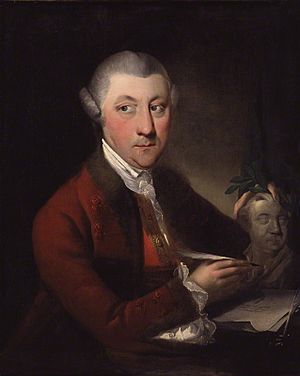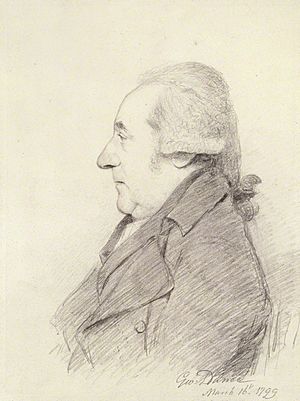Thomas Hull (actor) facts for kids
Thomas Hull (1728–1808) was an English actor and writer. He was well-known for his long career on stage and for helping to create a special fund for actors. He spent nearly 50 years performing at the famous Covent Garden Theatre in London.
Contents
Thomas Hull's Early Life and Education
Thomas Hull was born in 1728 in Strand, London. His father was an apothecary, which was like a pharmacist or doctor at the time. Thomas went to Charterhouse School. His family hoped he would become a church minister. However, he tried to follow his father's job first, but it didn't work out.
Hull's Acting Career
Thomas Hull began his acting journey in Dublin, Ireland, at the Smock Alley Theatre. Later, he moved to Bath, Somerset, where he helped manage a theatre.
First Performance at Covent Garden
His first recorded show was at the Covent Garden Theatre in London. This happened on October 5, 1759. He played the character Elder Wou'dbe in a play called Twin Rivals by George Farquhar.
Long Career at Covent Garden
Hull stayed at Covent Garden for a very long time. He worked there for 48 years without a break! He was proud that he only missed one performance during his entire career. That was when he had a fever and had to stay in bed.
Important Roles Hull Played
Thomas Hull created many original roles in new plays. Some of these included:
- Harpagus in Cyrus (1768)
- Edwin in Elfrida (1772)
- Pizarro in Alzuma (1773)
- Mador in Caractacus (1776)
- Sir Hubert in Percy (1777)
- Mr. Shandy in Tristram Shandy (1783)
From 1775 to 1782, Hull also helped manage the Covent Garden theatre.
Thomas Hull's Final Years and Death
Thomas Hull's last performance was on December 28, 1807. He played the Uncle in a play called George Barnwell. He passed away a few months later, on April 22, 1808. He died at his home in Westminster, London. He was buried in the churchyard of St. Margaret's, Westminster.
His sister, Anna Maria, married John Awsiter. Their daughter, Jane Elizabeth Awister, wanted to be buried with her uncle, Thomas Hull, when she died in 1837 or 1838.
Thomas Hull also played a big part in starting the Theatrical Fund. This fund helped actors who were in need. He took action after seeing an actress named Mrs. Hamilton struggling. He called other actors together to create this important support system. Hull was married to an actress named Miss Morrison.
Thomas Hull's Writings
Besides acting, Thomas Hull was also a writer. He wrote many plays and other books. Most of his plays were performed at Covent Garden.
Plays Written by Hull
- The Twins (1762): An adaptation of Shakespeare's Comedy of Errors.
- The Absent Man (1764): A short comedy.
- Pharnaces (1765): An opera adapted from an Italian work.
- Spanish Lady (1765): A musical show.
- All in the Right (1766): A short comedy from a French play.
- The Fairy Favour (1766): A special play written for the Prince of Wales.
- The Perplexities (1767): An adaptation of an older play, where Hull played Don Juan.
- The Royal Merchant (1767): An opera based on another play.
- The Prodigal Son (1773): An oratorio, which is a musical story, performed at a special event.
- Henry the Second, or the Fall of Rosamond (1774): A serious play in verse. Hull and his wife acted in it.
- Edward and Eleonora (1775): A play slightly changed from a work by Thomson.
- Love finds the Way (1777): A comic opera.
- Iphigenia, or the Victim (1778): A serious play adapted from a French translation. Hull played Agamemnon.
- The Fatal Interview (1782): A serious play that was not successful.
- True British Tar, or found at a Pinch (1786): A short musical show.
- Timon of Athens (1786): Adapted from Shakespeare. Hull played Flavius.
- The Comedy of Errors (1793): Another adaptation of Shakespeare. Hull was Ægeon.
- Disinterested Love (1798): An adaptation of an older play. Hull played Octavio.
- Elisha, or the Woman of Shunem (1801): An oratorio.
Other Books by Hull
Thomas Hull also wrote novels and collections of letters and poems:
- The History of Sir William Harrington (1771): A novel that was also translated into German and French.
- Richard Plantagenet, a Legendary Tale (1774).
- Select Letters between the late Duchess of Somerset, Lady Luxborough, and others (1778): A collection of letters.
- Moral Tales in Verse (1797): A collection of poems.
- A Collection of Poems and Translations in English and Latin (1780).
Hull was also friends with the writer William Shenstone and published some of his letters.
 | Sharif Bey |
 | Hale Woodruff |
 | Richmond Barthé |
 | Purvis Young |



